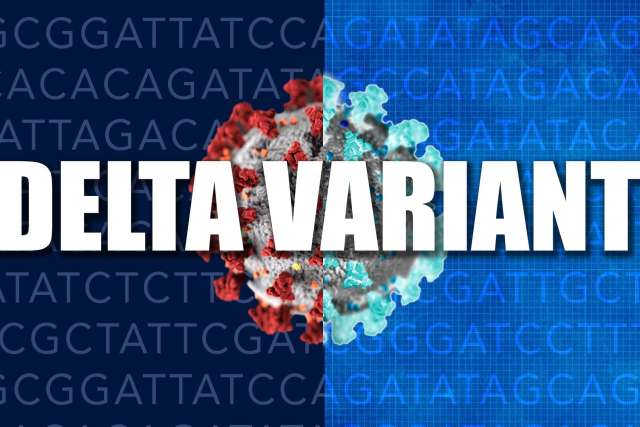Note: This article was updated after the July 15 announcement that Los Angeles County would re-instate its indoor masking guidance.
As the more infectious Delta variant of COVID-19 gains traction in the U.S., vaccination remains the best defense for preventing outbreaks and severe disease.
The mutation has increased the urgency to step up vaccination among those who have yet to get the shot, said Otto Yang, MD, a professor in the Division of Infectious Diseases at the David Geffen School of Medicine at UCLA.
“With a large percentage of the population vaccinated, if there are waves, most of the people that die are going to be unvaccinated, or those in whom the vaccine doesn’t work,” Dr. Yang said.
For fully vaccinated people who are concerned that Delta and other variants could diminish their protection, Dr. Yang recommended continuing to take reasonable precautions such as socializing outdoors and wearing masks when shopping.
“Delta is the same virus, it’s just more contagious,” Dr. Yang said. “The vaccines probably will still protect you from serious illness or death, just like against the original strain. The vaccines may be less effective for preventing you from getting a mild infection.”
In response to the threat of the Delta variant, Los Angeles County health officials are now mandating that everyone, regardless of vaccination status, wear masks indoors as a precaution as of Saturday, July 17. However, the U.S. Centers for Disease Control and Prevention says its guidance remains unchanged, and that fully vaccinated Americans no longer need masks indoors.
Random mutations

The Delta variant was first identified in India and is believed to be more contagious than the original virus strain. Federal health officials said in late June that they expect Delta to soon become the dominant strain in the U.S.
Dr. Yang said Delta contains a few mutations in the spike protein, which the virus uses to attach to a cell and infect it. He said the mutations occur randomly but the ones that benefit the virus begin to take over through natural selection.
“The virus has only been in humans for a short amount of time, relatively speaking,” Dr. Yang said. “It came from another animal species. It’s still adapting to humans. Recently, it’s been accumulating mutations to improve that adaptation.”
The Los Angeles County Department of Public Health reported that in the week ending June 12, the Delta variant comprised nearly 48% of all variants sequenced in the county.
“It’s not clear yet whether it’s more deadly or not,” Dr. Yang said. “It is clear it’s more capable of spreading from person to person.”
Boosting vaccination rates will give the virus less opportunity to develop mutations that help it spread.
“The more we slow or stop the spread of the virus, the less there is of the virus to replicate in people and in turn mutate, and the less chance of developing mutations like Delta,” Dr. Yang said. “If we were able to stop spread or reduce it to very, very low amounts, that would also reduce the risk of new variants coming up.”
Risk to the vaccinated
Dr. Yang said the COVID-19 vaccines were made to produce neutralizing antibodies to the spike protein of the original strain of the coronavirus. Because of the mutations in Delta, it may be somewhat resistant to those antibodies.
However, the vaccines also produce killer T cells, which work to prevent severe illness and death in an infected person.
“These mutations are not going to stop T cells from working, because unlike antibodies that need to attack a small region of spike, T cells can recognize almost any region of spike,” he said.
Dr. Yang said vaccine boosters can be designed to produce antibodies targeting Delta or other variants.
“I think it’s highly likely they’ll be necessary,” he said. “If the immunity is not going to be permanent, people are going to need boosters just because the immune response wanes over time. It’s very possible we’ll need boosters that contain different sequences to deal with these mutations that are coming up.”
Even as mask mandates have been lifted for those who are fully vaccinated in California, the World Health Organization recommends continued masking and social distancing because of the Delta variant’s spread around the world.
Dr. Yang said he’s continuing to wear a mask to help protect the unvaccinated, which include children under 12, as well as those for whom the vaccine doesn’t work well because their immune systems have been weakened by cancer or an organ transplant.
“From that standpoint, it’s very important to still mask and protect the vulnerable around us,” he said.
Dr. Yang also pointed out that severe illness and death are not the only negative consequences of infection, and that even mild infections may cause problems like blood clotting and heart damage.
Risk to the unvaccinated
Since vaccines first became available in December 2020, the Los Angeles County Department of Public Health reports that 98.7% of hospitalizations for COVID-19 occurred among the unvaccinated, as did 99.8% of deaths.
Dr. Yang said the risk of Delta to people who are unvaccinated depends on the extent of community spread.
“The amount of virus that’s circulating depends on a combination of how many people are vaccinated and how resistant the variants are to the vaccines in terms of still being able to infect a person,” he said. “It’s really hard to gauge right now. That’s in a state of flux. Certainly, the risk still exists.”
While cases are relatively low in Southern California, Los Angeles County noted small increases in cases, hospitalizations and daily test positivity in late June.
Additionally, fall and winter could bring another increase in cases.
“That’s a season when people are more crowded together indoors, and masking has been lifted,” Dr. Yang said. “It may be that the virus is seasonal, like some of the other coronaviruses. Some of the lull we’re seeing now may be related to seasonality; time will tell.”
As for people who have opted not to get vaccinated because they previously were infected, Dr. Yang said it’s likely their immunity is not permanent. He said coronaviruses that cause the common cold can reinfect people six months to a year later.
“There are more and more cases of people getting reinfected,” Dr. Yang said. “It’s most likely reinfection will be milder than the original infection but that’s not a guarantee.”
Dr. Yang said he hopes more Americans will get their shots. “It’s really clear these vaccines are extremely safe and extremely effective,” he said.
Get the latest information on COVID-19 vaccines.
Courtney Perkes is the author of this article.
Related articles
No more masks on the job for California workers fully vaccinated for COVID-19
Confused about California's new digital COVID-19 vaccine record?
Track the latest developments and look back at how the pandemic evolved




